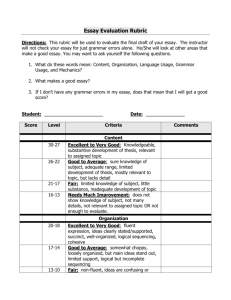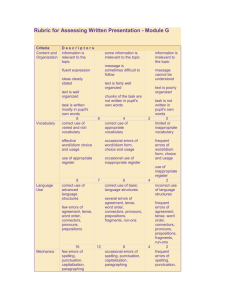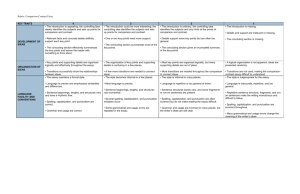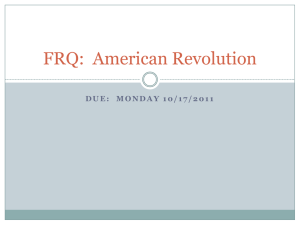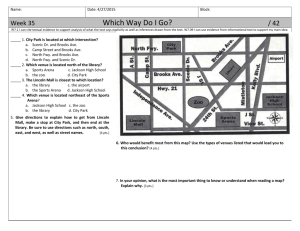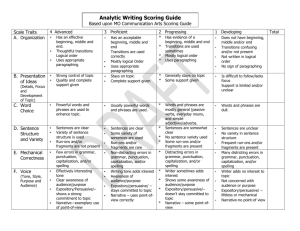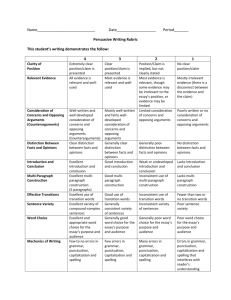Essay Evaluation Rubric
advertisement
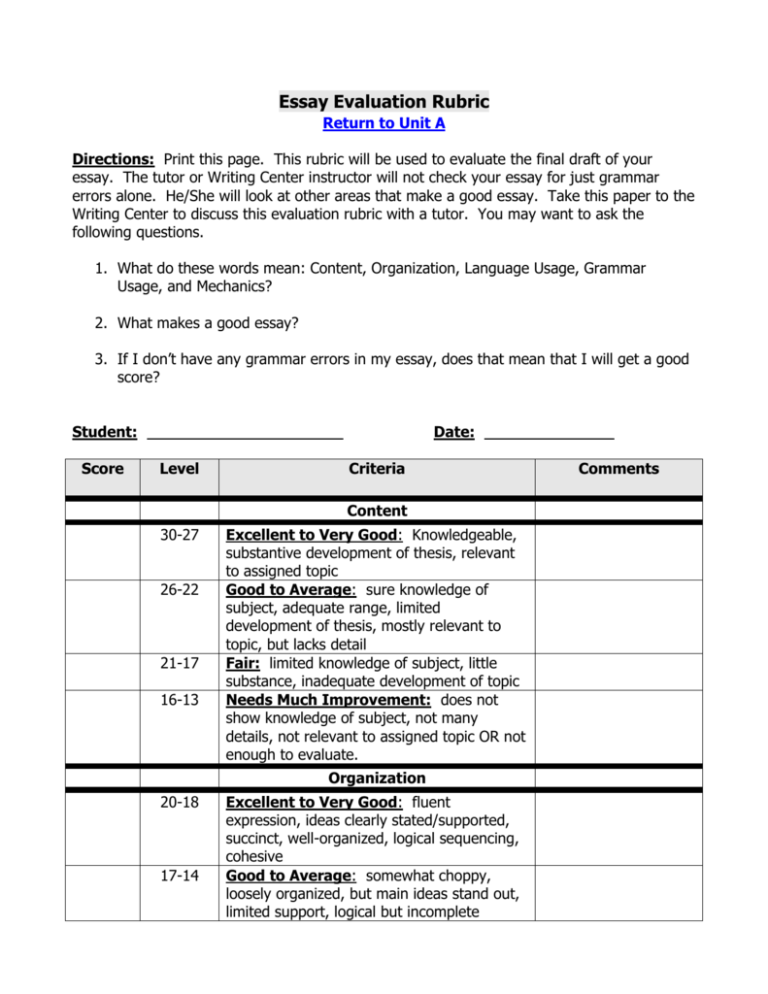
Essay Evaluation Rubric Return to Unit A Directions: Print this page. This rubric will be used to evaluate the final draft of your essay. The tutor or Writing Center instructor will not check your essay for just grammar errors alone. He/She will look at other areas that make a good essay. Take this paper to the Writing Center to discuss this evaluation rubric with a tutor. You may want to ask the following questions. 1. What do these words mean: Content, Organization, Language Usage, Grammar Usage, and Mechanics? 2. What makes a good essay? 3. If I don’t have any grammar errors in my essay, does that mean that I will get a good score? Student: Score Date: Level Criteria Content 30-27 26-22 21-17 16-13 Excellent to Very Good: Knowledgeable, substantive development of thesis, relevant to assigned topic Good to Average: sure knowledge of subject, adequate range, limited development of thesis, mostly relevant to topic, but lacks detail Fair: limited knowledge of subject, little substance, inadequate development of topic Needs Much Improvement: does not show knowledge of subject, not many details, not relevant to assigned topic OR not enough to evaluate. Organization 20-18 17-14 Excellent to Very Good: fluent expression, ideas clearly stated/supported, succinct, well-organized, logical sequencing, cohesive Good to Average: somewhat choppy, loosely organized, but main ideas stand out, limited support, logical but incomplete Comments 13-10 9-7 sequencing Fair: non-fluent, ideas are confusing or disconnected, lacks logical sequencing and development Needs Much Improvement: does not communicate, no organization OR not enough to evaluate Vocabulary and Language Use 20-18 17-14 13-10 9-7 Excellent to Very Good: sophisticated range, effective word/idiom choice and usage, word form mastery Good to Average: adequate range, occasional errors of word/idiom form, choice, usage but meaning understood Fair: limited range, frequent errors of word/idiom form, choice, usage, meaning somewhat confusing or not understood Needs Much Improvement: essentially translation, little knowledge of English vocabulary, idioms, word form OR not enough to evaluate Grammar Usage 25-22 21-18 17-11 10-5 Excellent to Very Good: effective, complex sentences, few errors of agreement, tense, number, word order/function, articles, pronouns, prepositions Good to Average: effective, but simple sentence construction, minor problems in complex constructions, several errors of agreement, tense, number, word order/function, articles, pronouns, prepositions, but meaning understood Fair: major problems in simple/complex sentences, many errors of agreement, tense, number, word order, articles, pronouns, prepositions and/or fragments, run-ons, deletions, meaning confused or not understood Needs Much Improvement: almost no mastery of sentence construction rules, many errors, ideas not understood OR not enough to evaluate Mechanics 5 Excellent to Very Good: few errors of 4 3 2 spelling, punctuation, capitalization, paragraphing Good to Average: some errors of spelling, punctuation, capitalization, paragraphing, but meaning understood Fair: frequent errors of spelling, punctuation, capitalization, paragraphing, poor typing, meaning confused or not understood Needs Much Improvement: many errors of spelling, punctuation, capitalization, paragraphing, typing is poor, OR not enough to evaluate Total Score: Instructor Comments: Rubric Adapted From: Reid, J. (1993). Teaching ESL Writing. New Jersey: Prentice Hall Regents.
